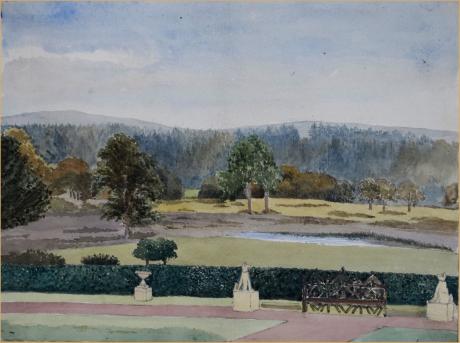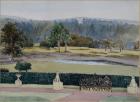inscribed and dated " View from the Library, Maresfield Park, Sussex, 1867"
Pike (1910, p.102) says that the house was believed to have been originally occupied by John of Gaunt. Later, it belonged to the Newnham family and passed into the Shelley family. The Duke of Wellington is believed to have planted a cedar tree in the grounds. In 1910 it was the seat of Prince Munster of Derneburg. As a German prince, he had to leave in 1914 and the estate was sequestrated and became an army camp.
Turner (1991, pp.61-64) says that after the war the estate broken up and in 1920 most of the house was demolished and laid to lawns, trees and shrubs. The ‘Map of Maresfield Park Around 1946' shows the Manor House. After that date the house was renamed Dendrons and was bought by Sir Roland Smith who died in 1990. The property was sold in 1991 and the purchaser promised to restore the house.
The origin of name of the village is uncertain, but the first element may derive from the Old English word mere meaning 'pool'; the second element is certainly feld meaning 'open land' (A. Mawer, The place-names of Sussex volume 2, page 349). Iron has also played an important role in the history of the area, during the time when the Wealden iron industry was flourishing. Within 2 miles (3 km) of Maresfield Church in the 16th century were five iron furnaces: Oldlands, Hendall, Old Forge, Lower Marshalls and Maresfield (powder mills). The Levett family owned and worked Oldlands, and it probably controlled Hendall as well, before it passed into the hands of Ralph Hogge, who formerly worked for the Levett family.
Among families long resident in the Maresfield area with historic ties to the old iron industry were the families of Levett, Pope and Chaloner, who had intermarried. William Levett of Buxted, a vicar who was a prime mover behind the iron industry in the Weald, had ties to the Maresfield area during his tenure as an ironmaster and supplier of armaments to Henry VIII. Eventually the vicar's former servant Ralph Hogge, who had become a major ironmaster after Levett's death, operated four furnaces and one or more forges within a couple of miles of Maresfield Church.
The village has expanded in the past twenty years, and three substantial housing developments have helped to increase the village population.
Maresfield is an old village (its church was founded in approx 1100; the present nave and tower were built between 1375 and 1415). Fairwarp and Nutley developed as offshoots from it.
There was a Roman settlement, including a bloomery, and later a Norman village grew up around the church. In the 15th and 16th centuries
Until 1926, it was a largely agricultural village, up to 1914 effectively in the ownership and control of the family in Maresfield Park House, initially the Shelley family and then Count Alexander Münster of Hanover, Germany. The estate was confiscated in 1914 by the government after the start of World War I and the Park and estate houses were sold off in 1924 as reparation for war damage, the Park being broken up into housing plots. In the First World War, a large army camp was developed, and later on parts of the village, at Queen's Drive and the southern part of Parklands, were developed as married quarters for soldiers.
There has been considerable recent development. Since approx 1990, substantial developments at the Cabin Café (now Mulberry Park), Park Farm (now The Paddock, Field End and Maple Close) and at Forest Park have increased the population of the village by about 1/3rd. New development of 80 dwellings is planned for Park Farm, which will further enlarge the village by about 1/6th.
Maresfield is on the southern edge of Ashdown Forest which was a deer hunting reserve from the time of King Edward II of England.
The Site of Special Scientific Interest Rock Wood falls within the parish. This woodland is of biological interest, with uncommon mosses and ferns growing alongside the stream which flows through the site.The parish lies at the junction of two main roads: the A22 Eastbourne road; and the A272 cross-country road, the main road being on a bypass to the west of the village.
There are two local bus services that provide a local connection to surrounding areas. Maresfield has a local tennis club,cricket club, bowls club, football club and a gymnastics club all located in less than one mile radius of the Chequers Inn, Maresfield also has its own fishing lake 'Underhill Fishing Lake' and is managed by Crowborough and District Anglers Association. Maresfield has its own primary school in Bonners CE Primary School, although some children travel to Manor Primary School in Uckfield. Secondary school children travel into Uckfield College or Chailey School.


